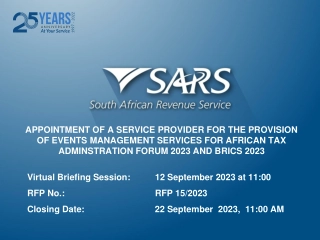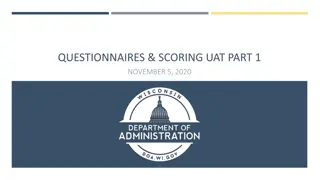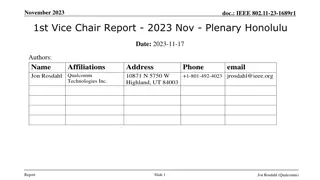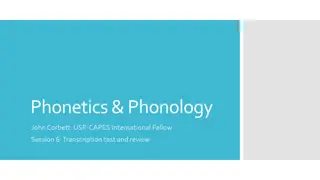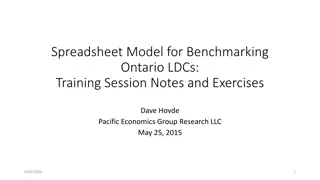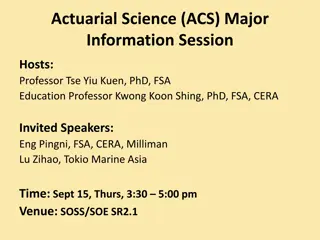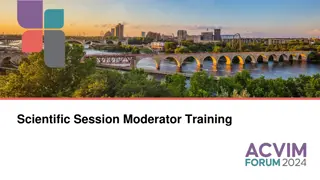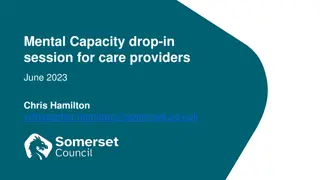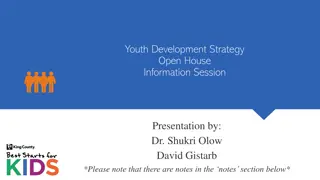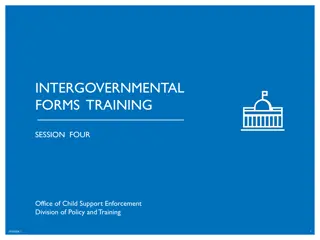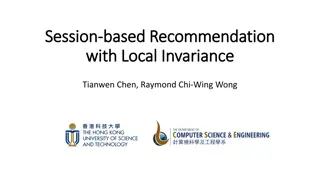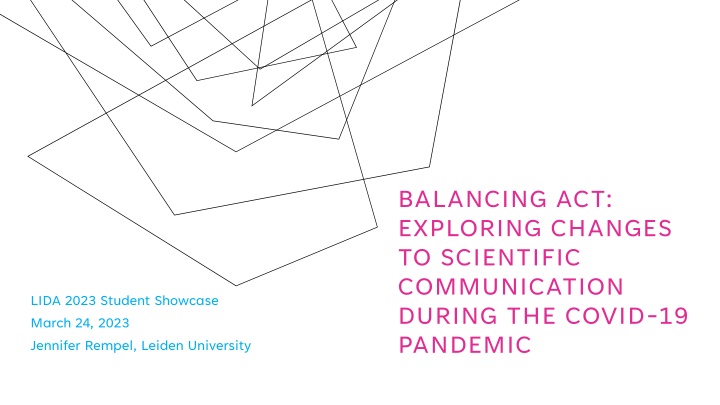
Impact of COVID-19 on Scientific Communication: Changes and Trends
Explore the shifts in scholarly publishing due to COVID-19, from traditional models to rapid peer review and open access. Witness a surge in publications, adjustments in pre-print processes, and the push towards greater accessibility. Jennifer Rempel delves into the landscape of academic communication during the pandemic.
Download Presentation

Please find below an Image/Link to download the presentation.
The content on the website is provided AS IS for your information and personal use only. It may not be sold, licensed, or shared on other websites without obtaining consent from the author. If you encounter any issues during the download, it is possible that the publisher has removed the file from their server.
You are allowed to download the files provided on this website for personal or commercial use, subject to the condition that they are used lawfully. All files are the property of their respective owners.
The content on the website is provided AS IS for your information and personal use only. It may not be sold, licensed, or shared on other websites without obtaining consent from the author.
E N D
Presentation Transcript
BALANCING ACT: EXPLORING CHANGES TO SCIENTIFIC COMMUNICATION DURING THE COVID-19 PANDEMIC LIDA 2023 Student Showcase March 24, 2023 Jennifer Rempel, Leiden University
JENNIFER REMPEL Information Literacy and Resource Access Librarian Athabasca University Library Athabasca, AB, Canada Book and Digital Media Studies Graduate, 2023 Leiden University, Leiden, Netherlands 2
Revision suggestions welcome! https://tinyurl.com/lida2023jrempel 3
AGENDA Traditional model of academic publishing COVID-19 disruption: Rapid peer review and open access Results Going forward 4
TRADITIONAL MODEL OF SCHOLARLY COMMUNICATION MS SUBMISSION Paper submitted to appropriate venue PEER REVIEW/EDITING Bottleneck! Time-consuming process PUBLICATION Paper published PAYWALL Non-OA articles are not accessible to non-subscribers 5
COVID-19: DISRUPTION!
COVID-19 AND CHANGES TO SCHOLARLY PUBLISHING MS SUBMISSION Researchers encouraged to submit to pre-print repositories in addition to journals PEER REVIEW/EDITING Rapid-review instituted by relevant publishers PUBLICATION Process shortened OPEN ACCESS OA articles made accessible to non-subscribers 7
RESULT: MASSIVE INCREASE IN OUTPUT unprecedented wave of publications (Odone et al. 2020) the largest 1-year increase in all scholarly articles, and the largest annual total ever (Brainard, 2021) 8
PRE-PRINTS: Pre-print server administrators recruited more volunteers in addition to regular staff to screen papers, and by increased staff and volunteer work hours Standards for inclusion relaxed Only 32%of pre-print servers involved researchers in vetting articles for criteria such as relevance of content (Kwon, 2020) 9
DeBruin, J. (2020, July 8). Guest post The Covid infodemic and the future of the communication of science. The Scholarly Kitchen. https://scholarlykitchen.sspnet.org/2020/07/08/guest-post-the-covid-infodemic-and-the-future-of-the-communication-of-science/ 10
PUBLISHED ARTICLES: Many publishers instituted fast-track peer-review for COVID-19-related materials (OASPA, 2020) The average time between submission and publication [was] reduced by nearly 50% (Horbach, 2021) 11
CONSEQUENCES exceptionally high retraction rate for COVID- 19-related publications (Yeo-Teh & Tang, 2020) poor adherence to identified research priorities and a predominance of opinion over data (Odone, et al. 2020) spread of misinformation in media / social media 20XX 12
Good preprint practices Screening irrelevant material; clearer guidelines Peer review triage Screening irrelevant material; clearer guidelines Incentives to publish Quality over quantity Public understanding of science Immunize media and public against misinformation through scientific literacy GOING FORWARD 13
THANK YOU! Jennifer Rempel jrempel@athabascau.ca j.rempel82@gmail.com
SLIDE REFERENCES: Brainard, J., (2021). A COVID-19 publishing revolution? Not yet. Science, 373(6560), 1182-1183. https://doi.org/10.1126/science.acx9043 DeBruin, J. (2020, July 8). Guest post The Covid infodemic and the future of the communication of science. The Scholarly Kitchen. https://scholarlykitchen.sspnet.org/2020/07/08/guest-post- the-covid-infodemic-and-the-future-of-the-communication-of-science/ Horbach, S.P.J.M. (2021). No time for that now! Qualitative changes in manuscript peer review during the Covid-19 pandemic. Research Evaluation, 30(3), 231-239. https://doi.org/10.1093/reseval/rvaa037 Kwon, D. (2020). How swamped preprint servers are blocking bad coronavirus research. Nature, 581(7807), 130-132. https://doi.org/10.1038/d41586-020-01394-6 Open Access Scholarly Publishing Association (OASPA). (2020, April 27). COVID-19 publishers open letter of intent Rapid review. https://oaspa.org/covid-19-publishers-open-letter-of- intent-rapid-review/ Odone, A., Salvati, S., Bellini, L., Bucci, D., Capraro, M., Gaetti, G., Amerio, A. & Signorelli, C. (2020b). The runaway science: A bibliometric analysis of the COVID-19 scientific literature. Acta Bio Medica: Atenei Parmensis, 91(9-S), 34-39. Yeo-Teh, N.S.L. & Tang, B.L. (2021). An alarming retraction rate for scientific publications on Coronavirus Disease 2019 (COVID-19). Accountability in Research, 28(1), 47-53. https://doi.org/10.1080/08989621.2020.1782203 15


